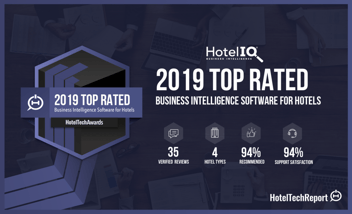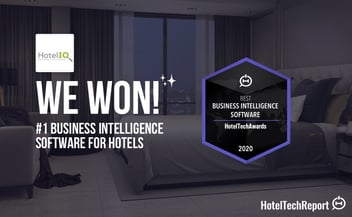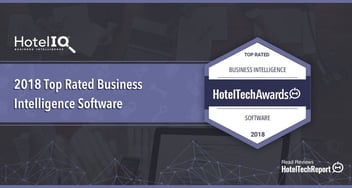HotelIQ Named Top Rated Business Intelligence Software in 2019 HotelTechAwards
Read MoreTable of Contents
In the fast-paced and highly competitive world of the hospitality industry, staying ahead of the curve is imperative – and one of the best ways to do that is using a hotel report. This comprehensive guide will delve into the world of hotel reports, exploring how they can be harnessed for maximum impact. We will also touch upon critical aspects such as hotel performance reports, hotel data analytics and the role of data analytics in the hotel industry. Let's embark on a journey to discover how analytics is helping the hotel business thrive in an ever-changing landscape.
What Is a Hotel Report?
Hotel reporting encompasses the entire process of gathering, analyzing and presenting data relevant to a hotel's operations. Hotel reports act as a bridge between raw data and informed decision-making, serving as an essential tool in maximizing profitability and efficiency.
Understanding Hotel Data Analytics
Data analytics in the hotel industry has evolved from a luxury to a necessity. It's the compass guiding hotels through a rapidly changing landscape. In an era where information is power, hotels that harness the potential of data analytics gain a competitive edge.
Hotel data analytics involves the systematic analysis of data related to various aspects of hotel operations – including guest preferences, booking patterns, pricing strategies and more – to drive strategic decisions and operational improvements that cater to the specific needs of their guests. These insights provide a deep understanding of the hotel's market, guests and operations, enabling hotels to fine-tune their strategies for improved results.
The Importance of a Hotel Performance Report
A hotel performance report is the backbone of any hotel's data-driven decision-making process. This report contains a wealth of information, such as occupancy rates, revenue per available room (RevPAR), average daily rates (ADR) and more. It provides a comprehensive overview of the hotel's financial health, allowing stakeholders to gauge its performance over a specific period. Hoteliers and general managers should be consulting these types of reports on a regular basis to ensure that they are meeting or exceeding their business and revenue goals.
Other Types of Hotel Reports
Effective hotel management relies on a variety of reports that provide valuable insights and data for informed decision-making. Here are some of the different types of hotel reports that are necessary for effectively managing a hotel:
- Daily Occupancy Report: This report provides a snapshot of the hotel's occupancy on a daily basis, including the number of rooms sold, available rooms and the occupancy rate. It helps with daily room allocation and pricing decisions.
- Revenue Report: A revenue report tracks the hotel's total revenue, broken down by different sources such as room revenue, food and beverage revenue and other income streams. It's crucial for understanding the hotel's financial performance.
- Housekeeping Report: This report monitors the status of room cleanliness, maintenance requests and housekeeping staff productivity. It helps ensure that guest rooms are properly cleaned and maintained.
- Front Desk Report: This report provides information on guest check-ins, check-outs, room assignments and any issues or requests raised by guests at the front desk. It helps streamline guest services and resolve any problems promptly.
- Rate and Inventory Report: This report tracks room rates, availability and restrictions. It's essential for managing pricing strategies, setting rates for different room types and controlling inventory distribution across various channels.
- Forecasting and Budget Reports: These reports provide financial forecasts and budget comparisons to help hotel management make informed decisions and plan for future financial goals.
- Guest Satisfaction Reports: Feedback from guests is invaluable. Guest satisfaction reports gather feedback from guest surveys and online reviews to identify areas for improvement and enhance the overall guest experience.
- Food and Beverage (F&B) Reports: These reports cover the performance of the hotel's restaurants, bars, banquets and catering services. They include details on revenue, menu performance and cost of goods sold (COGS).
- Marketing and Sales Reports: These reports track the effectiveness of marketing campaigns, sales efforts and booking channels. They help evaluate the return on investment (ROI) for different marketing initiatives.
- Financial Statements: Comprehensive financial statements, including income statements, balance sheets and cash flow statements, provide a holistic view of the hotel's financial health. They are essential for financial planning and reporting.
- Group and Event Sales Reports: For hotels that host events and conferences, these reports monitor bookings, occupancy and revenue related to group bookings and events.
- Maintenance and Repairs Report: This report tracks maintenance and repair requests, schedules and costs to ensure that the hotel's physical assets are well-maintained and in good condition.
- Competitive Analysis Reports: Competitive analysis reports help hotel management understand their position in the market by comparing key performance metrics with those of their competitors.
- Market Segmentation Reports: These reports provide insights into the types of guests the hotel attracts, such as leisure travelers, business travelers, or group bookings. They help tailor marketing and service strategies to specific market segments.
- Human Resources and Payroll Reports: These reports cover employee data, labor costs, scheduling and compliance with labor regulations. They are essential for managing the hotel's workforce efficiently.
- Environmental and Sustainability Reports: In an era of growing environmental awareness, hotels may track and report on their sustainability initiatives, energy usage and waste reduction efforts.
These reports serve as critical tools for hotel managers and owners to monitor and optimize various aspects of their operations. The data and insights derived from these reports enable them to make strategic decisions, enhance guest experiences, manage resources efficiently and drive profitability in the highly competitive hospitality industry.
Understanding Hotel Business Analytics
Hotel business analytics focuses on using data to enhance the overall business performance of a hotel. This includes revenue management, marketing strategies and resource allocation. By using business analytics, hotels can identify opportunities for growth and profitability.
Understanding Hotel Market Data Analysis

Hotel market data analysis involves evaluating market trends and competition. This form of analysis allows hotels to position themselves effectively in the market, adjust pricing strategies and identify growth opportunities.
What is the Most Important Hotel Report for Revenue Managers?
There is not one “most important” hotel report for revenue managers, as there are many different types of data that must be considered when establishing revenue management strategies and room pricing. Sophisticated business intelligence solutions can provide revenue managers (as well as the marketing, sales, operations and commercial teams) with all the data that they need in the following reports:
- Demand Forecasting Report: This report provides revenue managers with insights into future demand trends by analyzing historical data, booking pace and upcoming events or seasonality. It helps them anticipate fluctuations in demand and adjust room rates accordingly.
- Competitor Rate Analysis Report: Revenue managers monitor the rates of competitors in the local market. This report compares the hotel's rates with those of competing properties, helping revenue managers understand their price positioning and identify opportunities to price rooms competitively.
- Market Segment Performance Report: This report breaks down room bookings by market segments, such as business travelers, leisure guests, group bookings and more. It helps revenue managers identify which segments are performing well and which may need rate adjustments.
- Booking Channel Analysis Report: Revenue managers need insights into the performance of different booking channels, including direct bookings, online travel agencies (OTAs) and global distribution systems (GDS). This report helps them understand the cost of distribution and optimize channel mix.
- Lead Time Analysis Report: Lead time refers to the time between booking a room and the actual stay date. Revenue managers use this report to identify booking patterns and adjust rates based on lead times. For instance, offering discounts for early bookings or higher rates for last-minute reservations.
- Length of Stay (LOS) Analysis Report: This report analyzes the length of stay for guests. Revenue managers can identify trends, such as guests booking longer stays or shorter weekend getaways and tailor pricing strategies to encourage specific booking patterns.
- Booking Pace Report: Booking pace is the rate at which rooms are being booked for a particular date or period. Revenue managers track this to identify booking trends and assess the need for rate adjustments based on booking pace.
- Demand Calendar Report: A demand calendar provides a visual representation of projected demand and occupancy for specific dates. It helps revenue managers visualize periods of high demand and low demand, making it easier to set rates and restrictions accordingly.
- Rate Parity Report: Rate parity is the consistency of room rates across different online distribution channels. Revenue managers use this report to ensure that rates are consistent and avoid rate undercutting that can negatively impact revenue.
- Price Elasticity Analysis Report: This report helps revenue managers understand how changes in room rates affect demand. By analyzing price elasticity, they can make data-driven decisions on rate adjustments that maximize revenue.
- Post-Stay Analysis Report: After guests have checked out, this report analyzes the actual revenue generated for a specific date or period. It helps revenue managers assess the effectiveness of their pricing strategies and make adjustments for future periods.
- Booking Source Report: This report categorizes bookings by their sources, such as direct bookings through the hotel's website, third-party websites, or corporate bookings. It helps revenue managers evaluate the performance of different booking sources and optimize pricing strategies accordingly.
Key Metrics and KPIs in Hospitality Data Analytics

There are many key metrics that hoteliers and hospitality professionals need to continuously measure to assess the performance of their business, make data-driven decisions and improve their operations. Here are some of the key metrics and KPIs in hospitality data analytics:
- Occupancy Rate: The percentage of available rooms that are booked, which is a fundamental KPI for measuring a hotel's capacity utilization.
- Average Daily Rate (ADR): The average price of a hotel room sold, indicating the revenue generated per room.
- Revenue Per Available Room (RevPAR): A KPI that combines occupancy and ADR to measure a hotel's total room revenue generated per available room.
- Gross Operating Profit Per Available Room (GOPPAR): This KPI considers both room revenue and other hotel revenues while subtracting operating expenses, providing a more comprehensive view of profitability.
- Average Length of Stay (LOS): The average number of nights guests stay at the hotel, which helps in managing room inventory and revenue.
- Customer Acquisition Cost (CAC): The cost associated with acquiring a new customer, which is essential for assessing the effectiveness of marketing and sales efforts.
- Customer Lifetime Value (CLV): The total revenue a hotel can expect to earn from a customer throughout their relationship with the hotel. It helps in understanding the long-term value of guests.
- Market Penetration Index (MPI): Compares a hotel's occupancy rate to the average occupancy rate in its competitive set, helping evaluate market share.
- Revenue Share by Market Segment: Analyzes the contribution of different market segments, such as leisure, corporate, or group bookings, to the hotel's total revenue.
- Direct Booking Percentage: The percentage of bookings made directly through the hotel's website or reservation center, reducing reliance on third-party distribution channels.
- Online Reputation Score: Measures the hotel's online reputation by aggregating online reviews and ratings on platforms like TripAdvisor, Yelp, or Google.
- Customer Satisfaction Score (CSAT): Surveys and feedback from guests that measure their satisfaction and experience at the hotel.
- Net Promoter Score (NPS): Measures guest loyalty and the likelihood of guests recommending the hotel to others.
- Group Business Pace: Analyzes the number of group bookings in comparison to the same period in the previous year, helping in group sales and revenue forecasting.
- Online Booking Conversion Rate: The percentage of website visitors who complete a booking, indicating the effectiveness of the online booking process.
By leveraging data analytics and measuring these key indicators, the industry can adapt to changing market conditions, enhance profitability, and deliver exceptional guest experiences.
The Benefits of Hotel Reporting & Data Analytics
Data analytics has become a pivotal force that enables hotels to adapt, innovate and thrive, by offering:
- Enhanced Guest Experiences: Analytics helps hotels understand guest preferences and behaviors. This knowledge allows for personalized services, making guests feel valued and satisfied.
- Optimized Pricing Strategies: Data analytics aids hotels in setting the right prices at the right time. By analyzing market conditions, competitors and demand, hotels can maximize revenue.
- Operational Efficiency: Analytics identifies inefficiencies in hotel operations, enabling cost reduction and improved resource allocation.
- Marketing Precision: With data analytics, hotels can target their marketing efforts more precisely, reaching the right audience with the right message.
- Risk Mitigation: Analytics allows hotels to anticipate market trends and prepare for unforeseen challenges, reducing risks.
- Informed Decision-Making: Data-driven insights empower hoteliers to make well-informed decisions based on facts and trends rather than intuition.
Future Trends in Data Analytics in Hotel Industry

The hotel industry is continuously evolving, and data analytics is playing an increasingly crucial role in shaping its future. As technology advances and guest expectations change, several trends are emerging in data analytics within the hotel industry. Here are some of the future trends in data analytics for the hotel industry:
- Artificial Intelligence and Machine Learning (AI/ML): AI and ML are becoming integral to data analytics in hotels. They are used for demand forecasting, personalizing guest experiences, chatbots for customer service, and optimizing pricing strategies. AI can analyze vast amounts of data to identify patterns and provide actionable insights.
- Predictive Analytics: Predictive analytics leverages historical data to forecast future trends and behaviors. Hotels use it to predict demand, optimize pricing, and anticipate guest preferences. This can lead to more effective inventory management and revenue maximization.
- Real-Time Data Analysis: Real-time data analytics allows hotels to make instant decisions based on current market conditions and guest preferences. This is vital for dynamic pricing, inventory allocation, and real-time marketing campaigns.
- Guest Profiling and Personalization: Hotels are using data analytics to create detailed guest profiles. These profiles help in personalizing the guest experience, from room preferences to special services and amenities.
- Social Media and Sentiment Analysis: Social media monitoring and sentiment analysis tools are used to track online reviews, mentions, and feedback. This data can provide insights into guest satisfaction, identify areas for improvement, and help with reputation management.
- IoT (Internet of Things) Data: IoT devices in hotel rooms, such as smart thermostats and keyless entry systems, provide valuable data on guest behavior and room usage. Hotels can use this data to enhance energy efficiency and guest comfort.
- Blockchain for Data Security: Blockchain technology can be employed to secure guest data and transactions. It enhances data integrity and transparency, which is vital in maintaining trust and complying with data protection regulations.
- Sustainability Analytics: Sustainability and eco-friendly practices are gaining importance. Analytics tools are being used to track and analyze energy consumption, waste reduction, and other sustainability-related metrics.
- Market Segmentation and Niche Targeting: Data analytics allows hotels to identify and target niche markets with tailored offerings. This helps in maximizing revenue and occupancy during off-peak seasons.
- Alternative Accommodation Data: As competition from alternative accommodations like vacation rentals grows, hotels are using data analytics to assess the impact on their business and make informed pricing and marketing decisions.
- Robotic Process Automation (RPA): RPA is used for automating repetitive tasks, such as data entry and invoice processing. It enhances operational efficiency and reduces errors.
These emerging trends in data analytics reflect the industry's commitment to staying competitive, improving operational efficiency, and providing exceptional guest experiences. The hotel industry's ability to adapt to these trends will be key to its future success.
Why HotelIQ Decision Cloud is the Best Data Analytics Hotel Industry Software
Developed by hoteliers, for hoteliers, HotelIQ Decision Cloud is a commercial workspace that empowers hotel managers with actionable insights to help drive their business forward. Organize and analyze key performance metrics using dashboards and comprehensive reports, as well as create and manage forecasts and budgets more effectively using proprietary AI predictive models.
It gives sales, marketing and revenue management departments access to consistent, high-quality property data, enabling collaboration in identifying opportunities to increase bookings and revenue, while eliminating time-consuming manual data analysis—all without leaving the solution’s digital workspace. HotelIQ is where hospitality excellence meets data analysis and strategic decision-making.
Collaborate across teams to achieve revenue goals
With HotelIQ Decision Cloud, hoteliers can seamlessly integrate tasks and requirements across multiple business areas, enforcing data standards across all hotels and systems, providing a 360-degree view of their business. Schedule automated delivery of detailed hotel reports and share views with other internal users to level the data playing field and drive collaborative decision-making.
HotelIQ Decision Cloud provides the critical intelligence Revenue Management teams need to make informed decisions and build a sustainable revenue culture. You’ll develop a deeper understanding of your business and optimize your forecasting, pick-up & pace and booking channels helping you to reach new levels of sales and profitability.
HotelIQ Decision Cloud opens the flow of data across your organization, creating a consistent and reliable view of the data that all teams can access and collaborate on. The Account Management app gives sales teams access to highly interactive and visual information about corporate and agency performance initiating proactive, data-based decisions.
Using powerful insights from HotelIQ Decision Cloud’s dashboards and reports, you can design marketing campaigns delivering the highest ROI possible by deciding which customers to target—and when to target them.
HotelIQ Decision Cloud gives general managers and heads of operations visibility into their business and the ability to dig deeper into the data to uncover previously hidden trends and insights. Our application gives them the confidence to answer complex questions and identify risks and opportunities.
Drive your organization forward with HotelIQ Decision Cloud—from corporate to property levels. We offer a holistic, intuitive, cloud-based solution usable by all employees, regardless of department or role. Our guiding principle is “one set of reports for one organization.” Following this, we help you eliminate interdepartmental misinformation, save time and enable your organization to collaborate effectively to identify revenue opportunities.
Hotel Reports are the Key to Success for the Modern Hotelier
In the dynamic hospitality industry, staying ahead of the competition requires strategic decision-making backed by data-driven insights. Hotel reports, data analytics and insights play a pivotal role in this journey. By understanding the nuances of hotel reporting and embracing big data analytics, hotels can unlock their full potential and maximize profitability.
The future belongs to the savvy hoteliers who harness the power of data and analytics to create remarkable guest experiences, optimize operational efficiencies and drive sustained growth. Data derived from hotel reports are not just a tool; they are the key to success for the modern hotelier.
HotelIQ Decision Cloud gives hoteliers the vision, insights, and processes they need to excel as a business. It’s time to leverage the latest technology and transform your complex, confusing data into interactive dashboards, reports, and charts. Schedule a demo today to see how it works and how it can affect your property.
%20(1).png?width=400&height=124&name=21051_HotelIQ_logo_BJ_PB_DM_GR-05%20(1)%20(1).png)




Comments